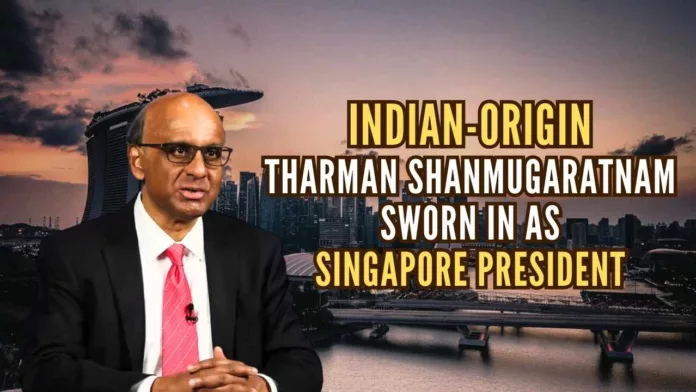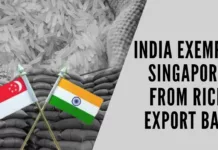
Indian-origin Tharman Shanmugaratnam sworn in as Singapore’s ninth President
Indian-origin Singapore-born economist Tharman Shanmugaratnam was on Thursday sworn in as the ninth president of the predominantly Chinese and economically prosperous city-state. Indian-origin Chief Justice Sundaresh Menon administered the oath of office to President Tharman at a ceremony held at Istana, a 154-year-old palace in the heart of Singapore’s Shopping and Hotel Belt of Orchard Road. The Istana is the official residence of the President of Singapore.
The ceremony was attended by Prime Minister Lee Hsien Loong, members of the Cabinet, MPs, top civil servants, and members of the diplomatic corps. Tharman, 66, will serve a six-year term. He succeeds President Halimah Yacob, Singapore’s first female president, whose tenure ended on September 13.
Singapore, in the past, has had two Indian-origin presidents. Sellapan Ramanathan, popularly known as S R Nathan, a Singaporean politician and civil servant of Tamil descent, served as the president of Singapore. In 2009, Nathan defeated Benjamin Sheares to become Singapore’s longest-serving president.
Chengara Veetil Devan Nair, better known as Devan Nair, served as the third president of Singapore from 1981 until his resignation in 1985. Born in 1923 in Malacca, Malaysia, Nair was the son of a rubber plantation clerk who was originally from Thalassery, Kerala.
Tharman Shanmugaratnam, who has served Singapore all his life in public service, was overwhelmingly endorsed by the city-state’s predominantly Chinese society. He surprised everyone by securing 70.4 percent of the votes in the presidential election held on September 1, leaving behind Chinese-origin business executives Ng Kok Song with 15.72 percent and Tan Kin Lian with 13.88 percent votes out of about 2.2 million ballot paper casts.
Tharman is married to Jane Ittogi, a Singaporean lawyer of Japanese-Chinese heritage. They have a daughter and three sons. He attended the premier Anglo-Chinese School before graduating from the London School of Economics (LSE) with a Bachelor of Science degree in economics. He subsequently went on to Wolfson College at the University of Cambridge, where he completed a Master of Philosophy degree in economics. He then became a student at the Harvard Kennedy School at Harvard University, where he completed a Master in Public Administration (MPA) degree and was a recipient of the Lucius N. Littauer Fellows Award, given to MPA students who demonstrate academic excellence and leadership.
Tharman was a student activist while studying in the UK during the 1970s. He originally held socialist beliefs, but his views on economics evolved over the course of his career. Tharman, as the Tamilian is popularly called, is the people’s President, says Singapore Friday weekly, Tabla! Tharman brings extensive experience to the Presidential office as he has served for over two decades in Singapore’s economic development. He was senior minister, deputy prime minister (May 2011 to May 2019), and finance minister among other posts as well as served in leadership positions at major international organisations such as the International Monetary Fund, World Economic Forum, and United Nations Development Forum.
He resigned in July from public and political posts in the ruling People’s Action Party to contest the election for president. “Magic of Singapore’s multiracialism,” wrote Asad Latif, an editorial writer for The Straits Times – a mainstream daily.
Chinese account for 74.3 percent of the city-state of about 5.6 million population, Indians about 9 percent, and Malays close to 13.5 percent with the rest others in a country that is an Asian financial and business hub, winning over the best talent from the world over. “Tharman’s victory is that of Singapore’s multiracialism. His Indianness is a part of that system and structure. May these verities never change,” wrote Latif. The President in Singapore is in a non-political position but with the power to keep a check on the national reserves, top appointments in the public sector, and authority to call for investigations into corruption.
For all the latest updates, download PGurus App.
- Supreme Court rejects plea to tally all VVPAT slips with EVM votes; says ‘no going back to paper ballot’ - April 26, 2024
- US report citing human rights violations is deeply biased: India - April 25, 2024
- Kotak Mahindra Bank shares tank 13%. Market Cap erodes by Rs.37,721 cr post-RBI action - April 25, 2024










